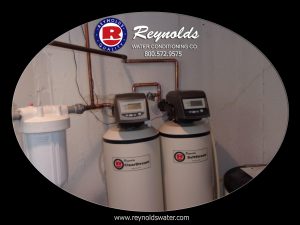There are both advantages and disadvantages to the two types of water softeners commonly purchased: potassium chloride (salt-free) and salt water softeners. The choice if often based on the area in which you live, the quality of your homes water, and health concerns that may or may not exist.
It is important to note that although we refer to potassium chloride, salt-free units as water softeners they are technically not water softeners at all and instead water conditioners or descalers. Systems that use potassium chloride over salt are known to reduce the build up of limescale. Limescale is the chalk like substance that leaves dried up hard water spots on faucets, glass wear, and such. Water conditioning systems alter the chemical make up of the waters minerals through a descaling process. Solids are then prevented from depositing within pipes and other water-using fixtures.
So, is a salt-free water conditioner beneficial over a traditional water softener that uses a salt ion exchange process to remove the minerals from your homes water? One of the nicest things that come along with salt-free water systems is that they don’t waste water in the same manner as traditional water softeners. Salt-free water softeners/conditioners are less expensive to operate and require less maintenance. Water that has been conditioned isn’t slippery like water coming from a water softener can. One concern with a potassium chloride system is that they are not as effective as water softeners when it comes to improving the water in places where water sits in place, such as a water heater. These areas can still have issues where limestone builds up.
How well a salt-free water softener will work to improve the quality of your homes water will depending on the minerals and contaminants in your water. Some areas saltless water softeners/conditioners don’t work as well as others due to the hardness of the water. It is important to have your homes water properly analyzed to see exactly what you are dealing with before purchasing a unit for your home.
When water softeners are utilized it has been proven that they extend the lifetime of appliances that require water. Water softeners are good for your plumbing, water heaters, shower heads all while using less soap in laundry, dishes, and baths.
In order to ensure that you are purchasing the right system for your families need it is crucial that you speak with professional at Reynolds Water Conditioning and have them test your water. It is up to you to know the difference between products that will work for your water situation and work with an expert to find a system that will offer you the benefits of quality water, longer lasting appliances, and more efficient soap usage.
The experts at Reynolds Water Conditioning have a solution to your homes unique water quality needs including: arsenic, bacteria, chlorine, rotten egg smell, fluoride, hard water, iron, lead, acid, tannins, radon, and more. More information on our water treatment solutions including water softeners and conditioners, water filtration and purification, reverse osmosis drinking water, and iron & odor removal can be found online at https://reynoldswater.com.
